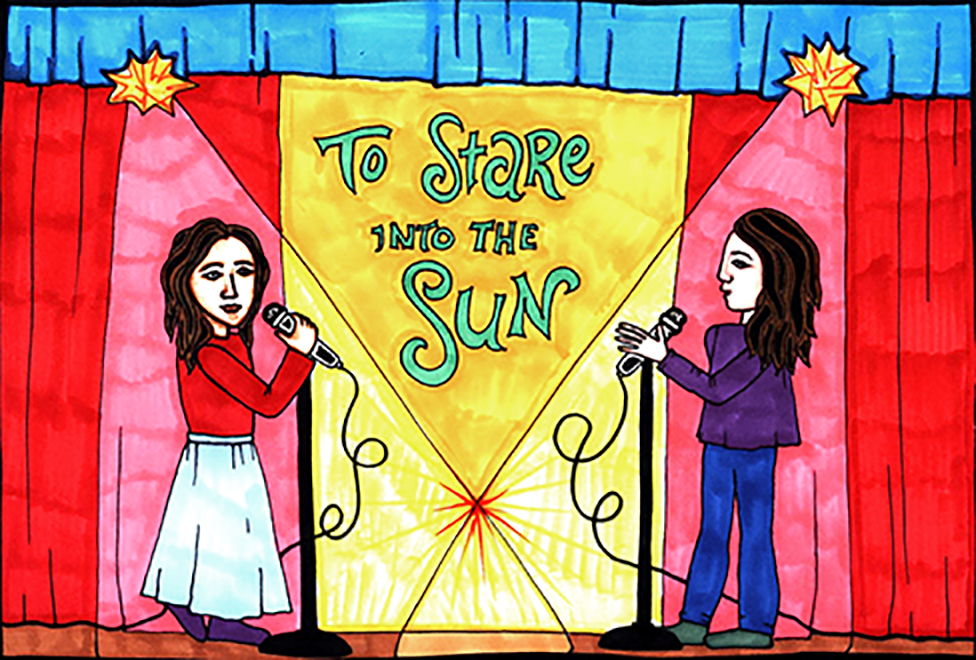To Stare into the Sun: LCC Unpacks Asian American Underrepresentation in Entertainment

Design by Simone Montgomery
Four the Lapu the Coyote that Cares (LCC) Theatre Company alumni discussed what it’s like to be an Asian-American in entertainment last Friday, Oct. 27, from 7 p.m. to 9 p.m. in the Northwest Campus Auditorium. The UCLA LCC Theatre Company hosts the discussion panel every year to highlight Asian-American underrepresentation in entertainment and recruit students who want to change this.
The speakers this year possess exemplary backgrounds in scriptwriting, acting, digital marketing, and TV producing. Michael Golamco, one of the first-generation members of the LCC theatre group, is critically acclaimed for his writing on shows like NBC’s “Grimm” and SYFY’s “Nightflyers.” Leonard Wu is an actor with top TV shows like “NCIS,” “Bones,” and “Marco Polo” under his belt. Angela Vesagas previously worked as a production intern turned executive producer for BLKBX Creative Group and is now a senior branded project manager at Buzzfeed. Stan Pham is the Director of Current Programs at CBS Entertainment and has experience at Disney and ABC.
All of the panelists are intimately acquainted with the glass ceiling Asian-Americans must shatter before they can succeed in any type of career within the entertainment business. Asian-Americans are still grossly underrepresented in entertainment, even behind the scenes, and so their narratives are repeatedly whitewashed and mishandled. Each shared their own personal story to share about the unfair expectations they must negotiate with before their talents are recognized in the first place.
Specific to Asian-Americans are the gendered misrepresentations they must contend with as well as their reputation as the “model minority.” Asian men are typically portrayed as less desirable or less masculine than men of other ethnicities; women, as sexually repressed. These misconceptions result from the self-effacing way western media has historically portrayed collectivist cultures to be. For another, the perceived ideal of Asian excellence is problematic in the way it downplays the socioeconomic difficulties Asians still face, even and especially across different subgroups within this population, as a marginalized group.
By misrepresenting Asian excellence over that of other minority groups as proof that it is not systematic racism but laziness which afflicts other minority groups, the media gaslights the latter with the implied suggestion that their grievances with the system are unfounded. This can potentially foster interracial resentment between those minority groups and Asian-Americans, which distracts from their collective goal to dismantle white dominance.
During the panel, Golamco and Vesagas shared their personal experiences of discrimination while working in entertainment. “Okay, so there’s this thing called a ‘diversity hire,’” Golamco grimaced. He summarized it as old rich white men acting on professional advice to hire token minority members to add multicultural flavor to white-centric narratives. Golamco was a diversity hire when he was starting out, and he recounted working harder and longer than all of his colleagues—just to prove that he had the same qualifications normal hires did. Because it’s a diversity program, the perception is that diversity hires are not as good as normal hires, so they really have to prove their worth.
Vesagas noted that it is even harder to be taken seriously by her colleagues as she is not just a person of color but also a woman. “There have been very many, many [moments] when… a male—a white male[—]gets put into a position above me, even though I’ve worked harder.” she quipped. But this culture of nepotism and bias continues to reward more privileged people for less work, while others must fight tooth and nail to get acknowledged for their contributions. While she believes that success does eventually come no matter who one is if she works hard, Vesagas warns that it is longer and more arduous for some and demands a lesson in empathy for others.
Despite Golamco and Vesagas’ struggles, they still shared Wu and Pham’s optimism for a brighter future. When asked how he felt about the hardships they have faced and will continue to face, Wu waved the question off. Sure, he acknowledged, discrimination against Asian-Americans in entertainment and in general is a serious concern—but as an artist and visionary, focusing on it is like looking at the sun. “Know that it’s there,” he coached aspiring entertainers within the audience, “but don’t let it blind you.” Because Asian-Americans, like other minority groups, sacrifice enough opportunities to grow professionally and artistically in order to spend their time fighting for better ones for the future. Wu emphasized the importance of Asian-Americans treasuring the opportunities they have while focusing on their respective crafts and not letting them go to waste. Pham further chimed in that Asian-Americans producing Asian-American content themselves is ultimately the best way to achieve better representation in entertainment. “Create what you want to see in the first place,” show that there is a demand for Asian-American talent by demanding it. See more Asian-centric material by creating it for others to see.
The speakers ended the panel with the suggestion that students eager to prove their worth should join LCC. The theatre troupe is dedicated to empowering Asian-American artists of all trades to produce, write, and perform plays. Each project they have showcases the passion and pride their members have for the talents and narratives all Asian-Americans have to offer—one you can support by, if not joining, then watching them.
More than anything, all four of the speakers agreed that their experiences of discrimination have taught them that humility is the most valuable trait entertainers—or people in general—can have. Their success despite their dehumanization by diversity quotas, sexist bosses, and Asian-American stereotypes, have made them all the more secure in their self-worth and equally affirmative of others’ worth. They all got as far as they did understanding that no one is inherently better than anyone else—and not letting others get away with telling them that.




